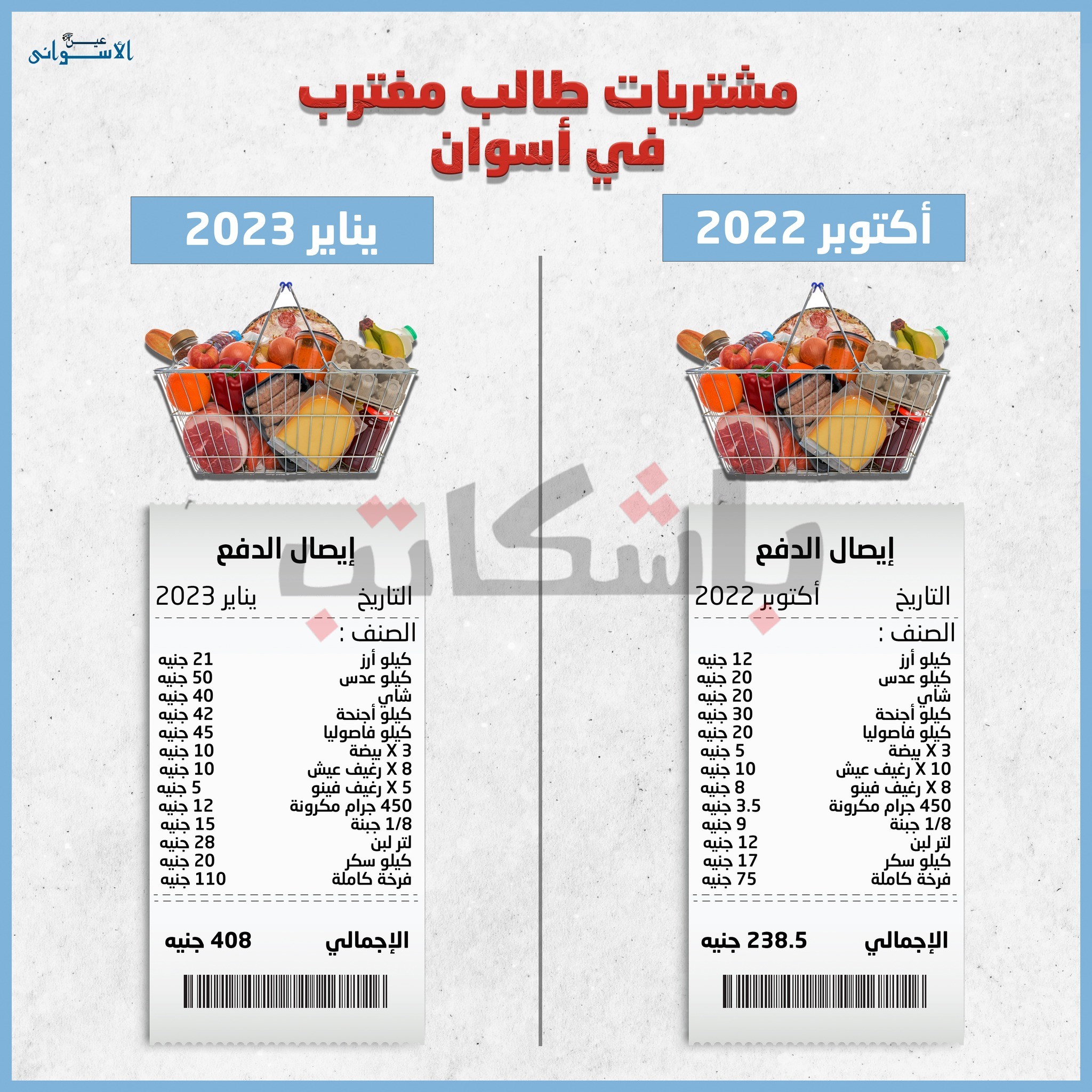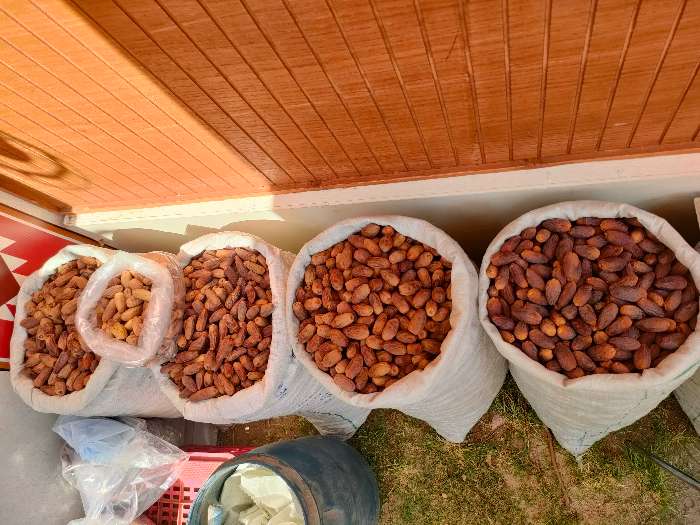Nada Maghazi woke up early in the morning to prepare her bag. She packed her clothes, textbooks, and essential summaries. Then, she prepared another bag to put a bottle of oil and some bags of rice and sugar.
Nada, a student at the Faculty of Education, Aswan University, says that bringing essential food items from her home for use in the university dormitory where she resides during the study period has become the situation for most students who come from different governorates. This comes after the rapid increase in prices in recent months, which is not commensurate with the stability of their main sources of income.
Nada adds: "We don't have available options; we are forced to adapt to the situation so as not to burden our families beyond their capacity,"
Since Nada started university last year, she has agreed with her dormitory mates to divide the food budget, saving on expenses and ensuring that the supplies last longer. This arrangement allows them to acquire a variety of goods, with each girl bringing several food items from her hometown. This not only provides diversity but also saves on travel expenses, as each student stays longer in the dorm without the need to return to her city to buy more groceries at lower prices.

Like everyone else, Nada and her colleagues have faced the crisis of rising prices. The bread bag she used to buy for 5 pounds, from which she and her colleagues could get 10 loaves, now contains only 8 loaves and is smaller in size than it was last year.
"Nada” tells "Ain Al-Aswani": "We no longer rely on consuming pasta, rice, and meat daily, and we don't eat them in large quantities. Any increase in food quantities will negatively impact the budget for the rest of the days. My colleagues and I have agreed to focus our spending on buying cooking essentials and only buy additional items when necessary,"
She adds: "Our families support us to pursue our dreams and continue our education, so we economize, considering their financial circumstances. My colleagues and I feel the pressure to maintain our budget as it is, despite the high cost of living. We allocate 100 pounds for food expenses, covering each of us for three weeks. We decided to buy low-cost items, avoiding the more expensive ones, and rely on bringing essential groceries from home,"
Nada and her colleagues rarely buy ready-made meals from restaurants because the amount they would spend on a single meal can cover their expenses for three whole days. They consume a bottle of oil and a bag of rice weekly, along with additional food ingredients such as vegetables.
The girls also pay monthly rent of 500 pounds, but they save on transportation expenses because the accommodation is close to the college, unlike staying in the university dormitory, which costs only 350 pounds per month but is far from the college. In that case, the girls would have to pay daily transportation costs.
Nada is not alone in facing the challenge of managing food expenses during her study period away from home. Many students share similar experiences, including Nada Hossib, a third-year pharmacy student at South Valley University in Qena. She travels from her hometown in Aswan, carrying with her a monthly budget of 800 pounds to cover her food expenses until she returns to Aswan again.
Nada says: "I bring rice, sugar, and oil from home due to their high prices. I allocate my budget to spend on the rest of the food items and bread. I have become accustomed to price hikes over the years of my studies and learned not to spend money except for essential purchases. Thus, I completely gave up buying ready-made meals and snacks. This allows me to buy the necessary basic items in the same quantities without being affected by the crisis of rising prices," Nada Hossib explains.
Despite the cutbacks that Nada makes in her budget, she has recently started spending more, especially after being forced to allocate a separate budget to buy bottled water because the water in the university dormitory is not suitable for drinking.
Nada buys a carton of mineral water weekly, priced at 55 pounds, which used to be barely forty pounds just a few weeks ago. Additionally, she spends 100 pounds monthly on printing summaries that she relies on for her studies. This is in addition to covering her accommodation rent.
As an attempt to mitigate the rising prices, the official Facebook page of Aswan Governorate announces the organization of a food exhibition with reasonable prices. In addition, surprise tours by officials will be conducted to visit stores and bakeries, ensuring that goods are sold at the designated prices. However, students still perceive this as an additional burden on their budgets.
The economic conditions are similar for both female and male expatriate students. Abdelrahman Jafar, a second-year student at the Technical Industrial Institute in Luxor, finds himself compelled to explore various selling points to purchase his food necessities. He is well aware that prices vary between outlets, even within the same city.
Jafar says: "The stores near my institute raise the prices of their products because the school season is their peak selling season. Therefore, the prices of goods vary from one area to another. I spend between 50 to 60 pounds per day because I live in an area where prices are constantly increasing. However, this amount may differ in another location," explains Abdelrahman.
Jafar attempts to reduce his monthly budget of 2000 pounds by sharing meals with his peers and buying essential goods from his village before traveling to Luxor. He notes that prices have multiplied, with a loaf of bread that used to cost half a pound now priced at one pound or more. In some places, the cost of 15 loaves may reach 20 pounds, and he tries to use this amount to purchase his daily food requirements.
The story of Mustafa El-Sayed, a second-year student at the Commercial Technical Institute in Aswan, is not much different. He buys everything, including bread, from his hometown Luxor before traveling to Aswan. In Aswan, the price of a loaf of bread reaches 75 piasters. His food budget is limited, ranging from only 700 to 800 pounds per month.
Mustafa stated, "Items that used to last for a month now only last for 20 days, resulting in a constant deficit in the food budget. I cannot spend from the rent or stationery budget, as they are priorities. Therefore, I decided to reduce food quantities and avoid buying ready-made meals from restaurants." He also mentioned resorting to another solution, which is sharing food with his roommates, as it makes goods available for a longer period.












